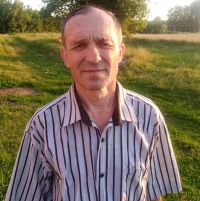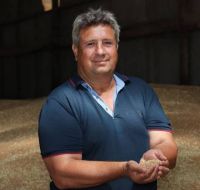Ukrainian Dairy Farms
Real Life Stories: How Ukrainian Dairy Farms Work Under War Conditions
The war has affected all dairy farms in Ukraine, from small to large, those that survived warfare and occupation, and those that were far from them. During the webinar «Dairy Farming at War: Real Stories» farmers from Sumy, Kyiv and Chernihiv regions shared their stories, problems and plans.
The story of Dementiev farm (Sumy region): «When we were milking cows, we prayed that they would be milked out as fast as possible»
The Dementievs' dairy farm, located in the village of Fesivka, Konotop district, was established in 2018. The farm owns 13 milking cows. With all the difficulties, it continues working and producing milk.
 «We didn’t see columns of Russian troops, but they were moving 5 km away from the farm. We were separated by a swamp. Fighter jets and rockets were flying over the village. We were terrified. We started our morning by going out and listening to where the shells were flying. If it was not dangerous, we went to feed and milk the cows. Every evening, when we were milking them, we prayed that the cows would be milked out as fast as possible so we could hide. We, milk producers, always fight for more milk, but here we asked for less,» Oleksandr Dementiev says.
«We didn’t see columns of Russian troops, but they were moving 5 km away from the farm. We were separated by a swamp. Fighter jets and rockets were flying over the village. We were terrified. We started our morning by going out and listening to where the shells were flying. If it was not dangerous, we went to feed and milk the cows. Every evening, when we were milking them, we prayed that the cows would be milked out as fast as possible so we could hide. We, milk producers, always fight for more milk, but here we asked for less,» Oleksandr Dementiev says.
With the outbreak of the war, a family farm lost income as the processor that had collected milk from it stopped working. Milk, cream, and cottage cheese were given out for free. The family was short for money to start a spring planting campaign.
«We were lucky because we weren't physically affected at all. The main problem was to start the sowing campaign. As we sowed perennial grasses on half of our fields, we needed to apply nitrogen fertilizer. Thanks to the Family Dairy Farms Project (ed. — the farm joined the project in 2021), many farmers got to know about our difficulties and helped financially. This money was a great help — we bought some fertilizers. However, we were able to go out into the field to fertilize grasses two weeks after the Russian troops had left Sumy region. It took some time to demine the fields. We were a bit late in applying fertilizer. However, today we have a good crop of perennial grasses. We don’t graze cows because there is enough forage: we still have last year's hay and there will be enough silage till the new harvest,» Oleksandr says.
Today the farm’s biggest problem is working capital. According to the owner, he could have invested more to get a better crop of fodder.
«Everything was done to the minimum to provide animals with forage. I applied to banks to get at least some credit, for example, to buy diesel fuel. I was told that there was not any opportunity at that moment. Usually with the money we earn we have an opportunity to buy everything we need for just one month. So we do not apply for loans. We earn money to buy diesel fuel and fertilizers. We bought corn seeds in autumn owing to the received subsidy for a kept cow. In the beginning of May, as soon as we had a chance, we sowed fodder crops».
The story of Krasnopilskii MMK LLC (Sumy region): «There was no access to farms since the second day of the war»
In 2016 Volodimir Mikhailovskii together with his companions bought a farm in Krasnopilsk district of Sumy region. A year later, it was divided into two divisions: a pig farm (Krasnopilskii MMK LLC), and Meat and Dairy Complex LLC, which includes two dairy farms. The pig farm was bombed for two weeks and Russian troops occupied it. Animals were dying for lack of feed and water. In the first month of the war the dairy farms also operated under water and grain feed shortages. 200 milking cows out of 350 remained.
 «In the first year after having bought a farm we ordered fodder from the agroholding, which had sold it. The next year we partially produced forage by ourselves and in the third year we completely produced it by ourselves. At the beginning of the war we bought a new tractor. If not for the war, we would have bought a silage harvester. By the way, this year we did not make haylage for one simple reason — a harvester did not come due to the lack of fuel.
«In the first year after having bought a farm we ordered fodder from the agroholding, which had sold it. The next year we partially produced forage by ourselves and in the third year we completely produced it by ourselves. At the beginning of the war we bought a new tractor. If not for the war, we would have bought a silage harvester. By the way, this year we did not make haylage for one simple reason — a harvester did not come due to the lack of fuel.
There was no access to farms since the second day of the war, people worked by themselves, almost a month in conditions when either there was no water, or it was impossible to bring grain. Our warehouses are on the pig farm so it was impossible to get there because the Russian troops had completely occupied it. The technology of milk production was broken. During the first month of the war we gave milk out to people. Shelling continues. We are getting ready to harvest fodder despite the threats of shelling. We hope that corn for silage will not be burned,» Volodymyr Mykhailovskii says.
He says that in the first month of the war the farm suffered heavy losses, so there are no finences for further development: «We hope to survive. We can hardly do it without on-farm milk processing. However we can't afford it. We were refused a credit, although we have a good credit history and have never been in arrears. We will look for donors abroad.
In addition, milk producers do not have enough land to expand production. Today it is completely unreal. I suggested a very simple thing — to create a fund of land for dairy producers using pastures, hayfields, etc. Nothing has been done. I actively participated in the development of a program to support cattle breeding in the region, in which we included the auction for the lease of agricultural land for dairy farmers. Every year we ask for the unused lands to develop them as dairy farms. All the land goes to agricultural holdings.»
The story of the private household (Kyiv region): «Cows cannot graze in forests and forested areas because of mines».
A private household in the village of Pischana, Bila Tserkva district, has 4 milking cows, and by 2014 there were 10 cows.
«We faced our first problem in 2014, when ATO participants started to receive land plots resulting in less meadows and land for haying and grazing. We understood and accepted the situation and therefore reduced the number of cows.
With the beginning of the war we faced the problem of selling dairy products. And not so much with clients, we worked up for 25 years, but with its transportation to them. All markets in Bila Tserkva were closed.
There are only six cows in our village herd. By comparison, when I came here, there were 167. In the first days of the war, milk and dairy products were given out to the villagers for free. There was not enough for everyone, so we provided internally displaced people in our village with milk first. Later, sales improved.
Hardly had we coped with this when in the middle of April there was a problem with cows feeding. We could not start grazing and pasture turnout. Our cows graze mostly in the forests and wooded areas, but now it is impossible because of mines. There is some unused farmland, but it is catastrophically small. At that time this issue was partially solved, we used the uncultivated plots of our villagers, but today our cows are not fully supplied with fodder. We have mowed everything we could, even those grasses that we have never used before. Now we are thinking about reducing our herd again,» Yuri Fedoruk said.
The story of the Naporivske farm (Chernihiv region): «We will do our best and in 2−3 years we will restore the farm».
The farm in Lukashivka is a family business that started with 7 cows. On March 8, Russian soldiers shelled the farm and seized it next day. Naporivske was under occupation for 21 days. Before the war, the farm produced about 3 tons of milk per daily; today they barely milk 500 liters here. Despite significant losses and damages, the owner Grygorii Tkachenko with his wife and two sons feel optimistic.
 «The uninvited guests have caused great damage, which cannot be assessed. Before the start of the war there were 316 heads of cattle, including 174 milking cows. Two-thirds of the herd — 158 cows — died. The situation is difficult, but under control. We will do our best and in 2−3 years we will restore the farm. It will be even better than it was, — Grygorii Tkachenko says. — Before the war the dairy farm was profitable and it was developing dynamically. Today we have to rebuild the farm. We need money for this. The started the reconstruction with the milking parlour. One of the rockets hit the refrigeration equipment. The dairy, which collects our milk, helped to solve this problem. We gathered cows that ran away from the farm during shelling and started producing milk. Now we do not expect to get much from these animals — we have what we have. We will try to rebuild the farm. Almost the entire team of the farm is working. One man died and three workers are in the army. We successfully conducted the sowing campaign, animals are provided with fodder. We do and will continue to work.»
«The uninvited guests have caused great damage, which cannot be assessed. Before the start of the war there were 316 heads of cattle, including 174 milking cows. Two-thirds of the herd — 158 cows — died. The situation is difficult, but under control. We will do our best and in 2−3 years we will restore the farm. It will be even better than it was, — Grygorii Tkachenko says. — Before the war the dairy farm was profitable and it was developing dynamically. Today we have to rebuild the farm. We need money for this. The started the reconstruction with the milking parlour. One of the rockets hit the refrigeration equipment. The dairy, which collects our milk, helped to solve this problem. We gathered cows that ran away from the farm during shelling and started producing milk. Now we do not expect to get much from these animals — we have what we have. We will try to rebuild the farm. Almost the entire team of the farm is working. One man died and three workers are in the army. We successfully conducted the sowing campaign, animals are provided with fodder. We do and will continue to work.»
The farm does all it can, but it needs help from the state. The problem related to blocking of tax invoices remains unsolved.
«All documents have been destroyed, including those in electronic form. Some papers were collected all over the territory, but most of them could not be restored. We wrote letters to all possible authorities that the aggressor had robbed our company. Unfortunately, the State Tax Service of Chernihiv region reported that as of the date of our appeal there was no list of territories where military operations were conducted and the territories temporarily occupied by the armed formations of the Russian Federation.
For more than two months, our loan application is being considered. This is primarily due to the fact that it took a long time to restore the company and accounting data. There must be some state guarantees for agricultural producers to get a loan. Even if we do not get it, we will still set up milk production,» Grygorii Tkachenko says.
Information and communication webinar «"Dairy Farming at War: Real Stories» was held by the National Association of Agricultural Advisory Services of Ukraine on June 23, 2022. It was held in the framework of the implementation of the Swiss-supported «Dairy Advisory» project under the Swiss-Ukrainian program «Development of trade with higher added value in the organic and dairy sectors of Ukraine», implemented by the Research Institute of Organic Agriculture (FiBL, Switzerland) in partnership with SAFOSO AG (Switzerland), qftp.org/.